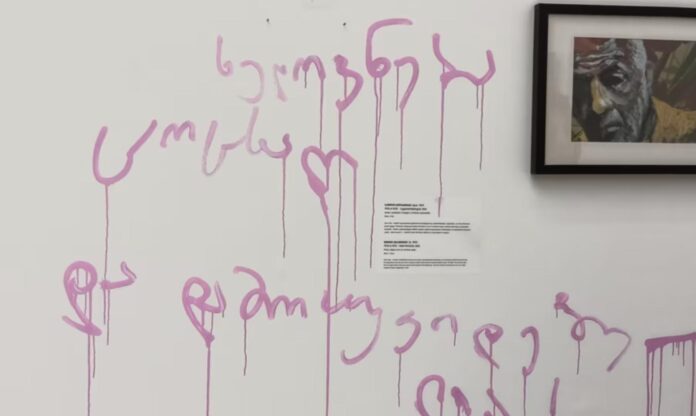A performance art protest in the Western Asian country of Georgia has provoked a political storm among leading officials within the ruling Georgian Dream party.
On 4 February, the Georgian artist Sandro Sulaberidze removed his painting Self-Portrait by the Mirror from an exhibition in the National Gallery of Georgia in Tbilisi and spray-painted, in Georgian, the words “art is alive and independent” on the gallery’s walls.
After this action, which is understood to have been in protest against the Ministry of Culture, the show’s curators were dismissed from their positions and the Ministry of the Interior declared that they were investigating Sulaberidze for theft—a crime which faces a maximum sentence of five years in prison.
In protest, eight other artists participating in the same exhibition said that they also wanted to remove their displayed works in solidarity with Sulaberidze. They later protested on Tbilisi’s Rustaveli Avenue outside the National Gallery and handed out leaflets. One of the artists who removed their work was David Apakidze, who told The Art Newspaper: “I think it’s the biggest thing that has happened in [Georgian] art history for last decade.”
The human rights NGO Pen Center Georgia also condemned the government’s move, with a spokesperson saying in a statement that the “Minister of Culture is incompetent and is deliberately destroying the institutions created as a result of the decades of hard work by artists […] and supporters of culture”.
The government called in a large number of police to deal with the protestors, with the activist Data Peradze reporting a bleeding nose and hurt lip. This prompted a post on the official Facebook page of the country’s President Salome Zurabishvili: “20 police cars in the backyard of the Blue Gallery. Does the artist pose such a threat to the state???? This reminds us of a different era and brings shame to Georgia.” She was presumably referring to the era of the Soviet Republic of Georgia, where political oppression of dissidents was widespread.
The investigation was dropped on 14 February. But the diplomatic damage had been done, prompting a war of words between the president and culture minister, who is also the deputy prime minister.
After the president’s condemnation of heavy handed policing methods against artists, the Minister of Culture, Sport and Youth, Thea Tsulukiani, sent civil servants to remove five pieces of art by the Georgian-American artist Svimon Dadiani from the Presidential Palace the day after the protest, in what was denounced by the president’s staff as a “political attack”. An advisor later pointed out that it was the president herself who had organised the restitution of these works from the US.

























